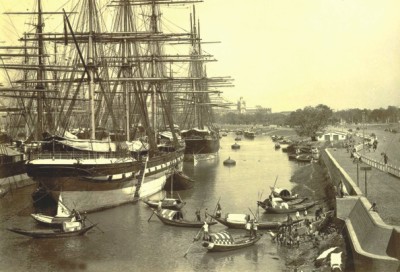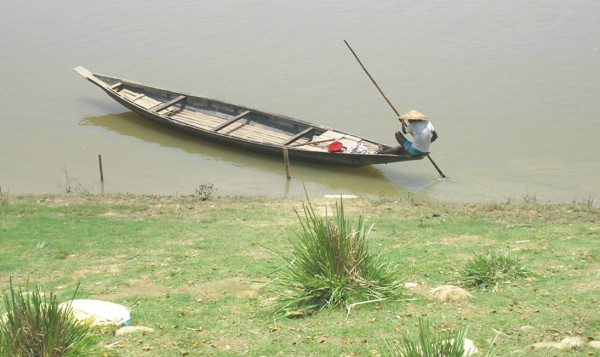|
History
Down the Surma
Origins of the Diaspora
Syed Zain Al-mahmood
 |
| The Lascars boarded British ships from the Hooghly port. [1890 Courtesy-Archives of the British Library] |
It all began with a blood feud. The year was 1778 and the East India Company had just appointed Robert Lindsay “Resident Collector” of Sylhet. Lindsay, an enterprising Scot, was determined to fill the Company's coffers. But at the same time he meant to look out for himself. Shortly after arriving in Sylhet, he started trading in elephants and limestone, and within a few years made a personal fortune. His dual role as trader and governor, however, stirred discontent. The Muslims of India were still smarting from their recent losses at British hands, and the Sylhetis in particular yearned for freedom. The leading families of Sylhet were stalwart Muslims, descendants of a long line of warriors and reformers beginning with Shah Jalal, the 'Saint of Kunya' and his companions. Lindsay himself regarded the tomb of Shah Jalal as a potential hotbed of resistance
Disaster struck the region in 1781 when a devastating flood wiped out the crop. The resulting famine killed almost a third of the population [W.W Hunter, 1868]. Although Lindsay wrote to Fort William, Calcutta urging tax exemption, the locals blamed the British for failing to prevent the catastrophe. There was an uprising, led by Syed Hadi and Syed Mahdi, sons of a prominent local family. In his Anecdotes of An Indian Life, Lindsay simply refers to the leader of the rebellion as “Pirzada” -- literally, “son of a religious leader”.
Lindsay and his army faced the Pirzada's followers near the site of the famed Shahi Eidgah in Sylhet. The rebels, armed with swords and spears, were no match for the firepower of the British. Although they fought gallantly, the uprising was swiftly quelled and the Pirzada was killed in battle. In Anecdotes, Lindsay recalls how he lived in fear of revenge attacks by the Pirzada's followers for as long as he remained in Sylhet.
By 1809, Robert Lindsay was back home in Britain leading a life of retired luxury. One day, while out riding, he spotted an Indian by the side of the road. On questioning, the man said he had arrived on a merchant vessel from Bengal. It turned out he was from Sylhet, and so Lindsay invited him to his mansion. The man, Syed Ullah, said he was looking for a Briton named “Lindsay”. “When I told him who I was, he looked at me with hatred in his eyes. 'So it was you who killed Pirzada!' ”
Syed Ullah had come to avenge Pirzada's death. Lindsay expressed regret and explained that he was doing his duty on that day. It is not clear how, but the wily Scot managed to gradually defuse the tension. After the two had made peace, Lindsay asked Syed Ullah if he could cook curry. The Sylheti man replied that curry was his specialty and he usually carried some spices with him. Lindsay requested Syed Ullah to whip up an “Indian” meal. Lindsay writes in his memoirs that his family members begged him not to eat anything cooked by the oriental man. His children's governess had apparently dreamt that a black man had poisoned the entire family. Lindsay, however, was unmoved. “Never was a curry better dressed,” he wrote in Anecdotes, “and never did I have a better meal.”
 |
| The journey began on the serene waters of the Surma. |
This strange incident may have been embellished slightly by Robert Lindsay, but it is actually the first specific report of a Sylheti in Britain. It is all the more remarkable because it brings together several of the threads that run through the early part of the British Bangladeshi narrative colonialism, the sea, and curry. Sylhet's maritime past has been all but erased. Ask a local man about the seafaring “Sarangs” of old and you are likely to get a blank look. But it was not too long ago that names like Ayub Ali Master, Surab Sarang and Chowdhry Sarang were household names in the Sylhet region. The name “Sarang Bari” (Mariner's Home) harks back to a forgotten era in Sylhet's history. Very rarely one meets an old-timer whose eyes will light up at the mention of those names. “Ahhh, those Jahaji (sailor) folk! They were brave men!”
At the turn of the twentieth century, thousands of young Sylheti men were serving on board British merchant ships. Sylheti voices were very common on the decks of the ocean-going vessels of P&O, Clan and Turner shipping lines. These intrepid seamen were known as Lascars. Lascar means “group of men” or army and the term reflects the nature of the contract with the shipping company. The lascars were not hired as individual sailors but as a crew, and their leader and spokesman was the sarang.
The number of Lascars on British ships swelled with the World Wars, as demand for able-bodied sailors grew. Many of the sailors had one-way contracts, and temporarily ended up on the docks of London and Liverpool until they could secure passage back home. Gradually seamen's hostels sprang up in the docklands, and a small but tenacious community was established. Some of the men married English women. Old records from the city of London archives refer to women known as “Lascar Sally” and “Calcutta Louisa”.
Hundreds of Bengali sailors perished during the wars. German U-boats dogged the merchant convoys and a large percentage was sunk. It is unclear how many Sylheti sailors died since the shipping companies normally lumped them as “native lascars”, but oral history paints a bleak picture of how the Sylheti men lived in constant fear of torpedoes. More than one third of the Sarangs who went to sea met a watery grave. Young Sylhetis who wanted to escape the treacherous conditions began to jump ship in London. They joined a small band of desperate men who made a living working in the factories that were running overtime to support the war effort. Gradually, the Sylheti community grew.
The question of why able-bodied Sylheti men went to sea is one that has not been adequately answered. It is a remarkable fact considering that Sylhet is a hilly area far from the coast. Many historians and sociologists while trying to solve this riddle have jumped to incorrect conclusions. Some have suggested that Sylheti men came into contact with British planters while working in the tea estates, and were recruited by shipping companies desperate for sailors. But this is a false notion. Sylhetis refused to work in the plantations. Tea planters regularly lamented the absence of local labour and the British were ultimately forced to bring in labourers by the trainloads from famine-stricken areas of Bihar and Orissa. To this day, tea workers have a different complexion and speak in a different tongue compared to local Sylhetis.
A study of the socio-political history of the region indicates that Sylhetis took to the ships for the very reason they refused to labour in the tea estates. The Permanent Settlement of Lord Cornwallis [1793], a system of land reform which essentially carved up the land between large zamindars in Bengal, was never in force in Sylhet. The Sylhetis remained independent landowners, but often the holding was not large enough and the land not fertile enough to support a growing population. They did not fancy doing menial chores for a pittance in the tea gardens, and so were forced to look outward.
Trade was the lifeblood of the British Empire, and there was a chronic shortage of seamen. Without cheap labour from the colonies the wheels of industry would grind to a halt. The conditions were harsh and the pay was low compared to European sailors, but Sylhetis still boarded British merchant ships in large numbers from Calcutta's Hoogly port.
The Sylheti sailors were used to cooking their own food on board ship, because they needed their food to be halal. This practice continued in London. The smell of curry wafted across the docklands. At that time there were many Englishmen in London who had returned after a stint in India, and they had acquired a taste for curry. One fine day a resourceful Sylheti had the bright idea of selling curry as street food. Ayub Ali Master, an ex-seaman, opened a Curry cafe in Commercial Road, London in the 1920s. Others soon followed, and the Sylheti community hasn't looked back since.
Fast forward to the present. There are an estimated half a million Britons of Bangladeshi origin. The Bangladeshi restaurant business is a £4 billion industry and young people today are increasingly looking to professions such as medicine, finance, law and IT to climb the socio-economic ladder.
Despite the success, complex challenges remain. A study in 2003 found that around 18 per cent of economically active Bangladeshi men were unemployed. This contrasts with whites (5 per cent) and Indians (7 per cent). Disadvantages in the labour market and a sense of exclusion force British Bangladeshis to look inward and to “stick to their own”.
Against this backdrop of increased sensitivity, Monica Ali's novel Brick Lane was always going to stir strong emotions. Although critically acclaimed, many British Bangladeshis felt it had portrayed the community in a negative way and made no mention of its struggle to integrate. “We are afraid it will reinforce negative stereotypes,” said Brick Lane resident Abdul Latif.
Monica Ali who has never lived in Brick Lane and does not speak Bangla, insists her novel doesn't represent all British Bangladeshis. But when the Times calls the book “a piercing look at British Islam” it becomes clear that like it or not, Ali is carrying the burden of representation.
Stereotypes came back to haunt British Muslims after the terrorist attacks of 7th July 2005. The response of the police and the media angered many British Bangladeshis, who felt Muslims had been unfairly criticized. “Government ministers spoke a lot about British values and the duty to integrate,” says Hasan, a banker in Bradford. “That implies that there is a fixed set of values or way of life that we must sign up to and we as a community somehow dropped the ball in that respect. We can't all be carbon copies.”
Despite a century of turmoil, the Bangladeshi community has carved out a place for itself in the mosaic of British society. In the process they have helped change the lot of their friends and families back here in Bangladesh. Both Britain and Bangladesh are evolving. Changing times mean new challenges and fresh opportunities for the Diaspora.
Standing on the bank of the Thames, you could almost hear the Lascars urging them on.
Copyright
(R) thedailystar.net 2008
|
